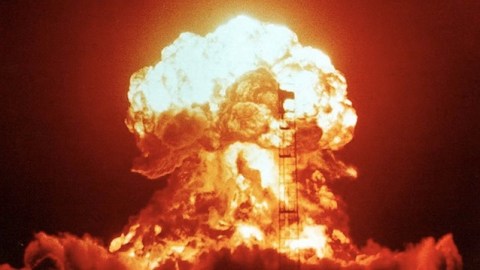Why Do Republicans Want to Stop START?

Why are Republicans trying to block ratification of the new START? The original START—short for Strategic Arms Reduction Treaty—was proposed by President Reagan to limit the number of strategic nuclear warheads the U.S. and the Soviet Union could have. It was signed by the first President Bush in 1991, just months before the collapse of the Soviet Union. It remained in effect between Russia and the U.S., limiting the number of warheads each side could deploy, although each still has enough to more or less entirely wipe out life on earth if it should so choose. Belarus, Kazakhstan, and the Ukraine also continued as parties to the treaty after the break up of the Soviet Union, agreeing to eliminate their nuclear forces completely under the treaty’s Lisbon Protocol.
The original START expired at the end of 2009, after twenty years in effect. President Obama negotiated a new START treaty with Russia before the old one expired, signing it in Prague in April of this year. The new START would further limit number of strategic nuclear warheads each side could deploy—although each side would still have enough to wreak unimaginable destruction—as well as limit the number of missile launchers each side could have.
But Republicans are blocking ratification of the treaty. Presidential hopeful Mitt Romney wrote over the summer that trying to extend START was Obama’s “worst foreign policy mistake” because the new treaty gives away too much and would limit our ability to defend ourselves against nuclear attacks from other countries. But as Fred Kaplannotes, the treaty doesn’t place any limits on our missile defense program, nor force us to limit our nuclear arsenal more than it forces the Russians to limit theirs. In fact, as Kaplanpoints out elsewhere, seven of the last eight heads of the U.S. strategic command and five secretaries of defense endorse the treaty. And Franklin C. Miller, the longtime civilian official in charge of strategic nuclear policy, has testified he is “confident that the United States can safely provide for our national security, and that of our allies, at the launcher and warhead limits that the treaty prescribes.”
Now Senate Minority Whip John Kyl (R-AZ), the Republican who takes the lead on nuclear weapons policy in the Senate, has decided to block ratification of the treaty. In the Wall Street Journal in July, Kyl wrote that the treaty would be “relatively benign” as long as we spent enough money to keep up and modernize our nuclear arsenal. Obama has since promised to spend $4.1 billion—more than Kyl said was necessary—doing just that. In spite of that—and to the surprise of Democrats, who believed they had addressed Kyl’s concerns—Kyl still opposes ratification. Kyl explains that he’s “come to the conclusion that the administration is intellectually committed to modernization now. No sane person could not reach that conclusion. Whether they’re committed in the heart is another matter.”
No concessions, in other words, will satisfy Kyl, who seems simply to want to deny Obama a legislative victory and prevent Senate from accomplishing anything before the new Congress arrives in January. Without Kyl, it’s going to be hard for Democrats to get the two-thirds vote they need in the Senate to ratify the treaty. Of course, as Adam Serwer points out, it was Kyl himself who attacked the administration last year for not renewing the treaty and potentially letting “an extensive set of verification, notification, elimination and other confidence-building measures will expire” for the first time in fifteen years.
Now, as Dan Drezner points out, Europe’s conservative foreign ministers have called on Republicans not to block ratification of the treaty, while both the Anti-Defamation League and the National Jewish Democratic Council say the treaty is essential to ensuring Russian cooperation in preventing Iran from developing nuclear weapons. In a recent interview on MSNBC, Sen. Dick Lugar (R-IN) broke with Kyl and called on his fellow senators “To please do your duty to your country. We do not have verification of the Russian nuclear posture right now. We’re not going to have it until we sign the START treaty. We’re not going to be able to get rid of further missiles and warheads aimed at us. I state it candidly to my colleagues, one of those warheads—and there were 13,300 originally—one of them could demolish my city of Indianapolis, obliterate it.”




